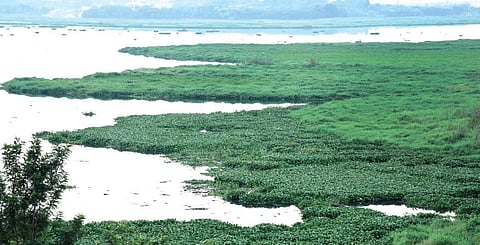

BENGALURU: The lakes of Bengaluru could hold the key to India’s green fuel. Scientists at Indian Institute of Science (IISc) and five IITs across the country are working on using the algaes found in water bodies to power vehicles as an alternative to petrol and diesel.However, in order for the algae to produce oil, the water bodies need to be clean. With IISc scientists saying that clean lakes have more potential to generate green fuel, the clean lake movement is likely to get a bigger push.
The researchers have been using the algaes found in city lakes and estuaries in the Western Ghats. Scientists at Energy and Wetland Research Centre (EWRC), Centre for Ecological Sciences (CES), have found that certain species of the microscopic algaes, also known as diatoms, have silica on the outer cover and contain lipids inside, which can easily secrete oil or biofuel and might replace fossil fuel.
The research is being led by Dr T V Ramachandra, Prof EWRC, CES, IISc and they have brought out a scientific paper titled ‘Bio-remediation and lipid synthesis through microtrophic algal consortia in Municipal solid waste’. The scientists have found such algaes in water bodies in Hessaraghatta, Jakkur, Bannerghatta and also in estuaries such as Aganashini in Uttara Kannada district.
The research started in 2009. Their objective was to identify an affordable process to treat the polluted water in city lakes and they started with Bellandur and other adjoining lakes. The water was processed and algae was cultured in the same water. Algaes treated the water and formed a good biomas. It was later understood that algae could bloom in the water bodies provided they are cleaned and pollution is curbed.
Also, the researchers have pointed out that algae harvested from natural conditions can secrete up to 29.5 per cent oil compared to the 16 per cent secreted by algae which have been cultured.
Dr Ramachandra said that in nature it takes millions of years for fossils to form. They are working on cutting down the time period while harvesting the algae with advanced technology which would mimic the natural process. However Dr Ramachandra could not furnish details of commercial viability as the research is in the initial stage.
IISc’s research
IISc is the country’s first organisation which began research on algal oil in a field condition. IISc has harvested several species of algae, quantified them and is now working on extracting oil and increasing the oil production. The experiment has been picked by American organisations like National Renewable Energy Society and a few private companies in India. However, these organisations are working on individual species cultured and stored by them.
Researchers find new species
While working on this project, the team of researchers found a new species of algae which secretes oil on its own. The algae, Botryococcus brauni, was discovered in Hesaraghatta lake and the same was found in a water body in Ramakrishna Mission premises adjoining Bannerghatta Biological Park. Other diatoms just store oil in them and they could secrete oil by natural enhancement.
Study done by
IITs in Mumbai, Kanpur, Delhi, Kharagpur, Roorkee
IIT Roorkee and Indian Oil Corporation
Indian Institute of Science
A Canadian university Why diatoms?
Geologists claim that a lot of crude oil comes from diatoms
Agriculturists say diatoms make 10 times more oil than oil seeds
Source of sustainable energy